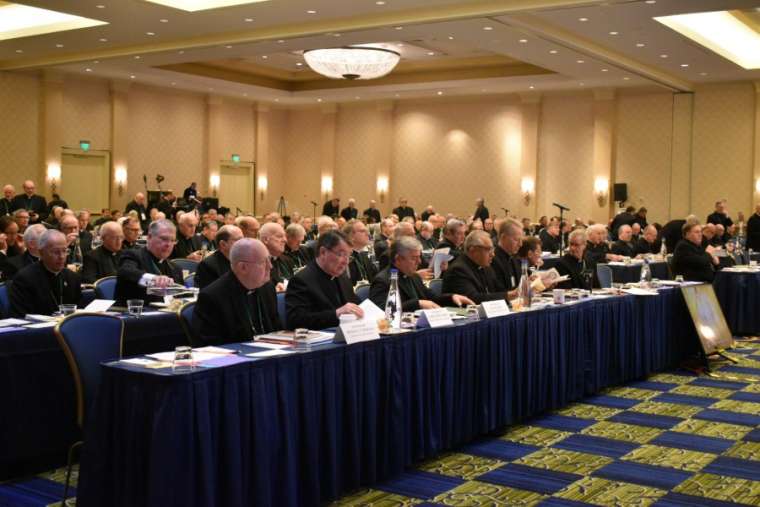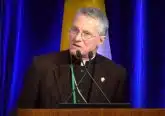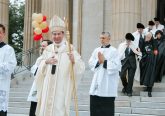Bishops reject funding hike for USCCB, for now
By Matt Hadro
Baltimore, Md., Nov 11, 2019 / 02:15 pm (CNA).- A proposed increase in diocesan payments to the U.S. Conference of Catholic Bishops (USCCB) has failed to attract sufficient support among the bishops on Monday, the first day of their annual general assembly in Baltimore.
Diocesan and eparchial bishops voted 111 to 55 on a measure that would have approve a requested three percent increase to the annual diocesan assessment that will be sent to the USCCB in 2021. The measure failed to receive the necessary two-thirds majority to pass, though its defeat is not yet definitive.
The bishops, gathered for their four-day meeting Nov. 11-14, were told by conference treasurer Archbishop Dennis Schnurr that a number of economic factors in, and out of the Church had impacted the finances of the USCCB. Concerns over the cost of clergy sex abuse settlements in U.S. Catholic dioceses was particularly highlighted.
Although the proposed rate increase did not pass, the vote was declared inconclusive because 28 eligible bishops were not present on Monday. The conference hall was told that once their votes are counted, the final outcome will then be announced. The bishops from New York state are currently in Rome for their scheduled ad limina visit with Pope Francis but are reportedly following the proceedings in Baltimore and able to vote remotely.
“It caused me no surprise,” Schnurr of Cincinnati told CNA of the inconclusive vote. As a longtime staffer and member of the budget and finance committee, he said that “this is nothing new under the sun.”
The diocesan assessment goes to fund administrative, pastoral, and public policy programs at the USCCB, and a regular increase is necessary to maintain the reserves of the conference, Schnurr said.
The archbishop acknowledged the financial challenges of some dioceses facing a resurgence in clergy sex abuse claims from new openings in state statutes of limitations.
“There are a lot of dioceses in this country that are looking at bankruptcy,” Schnurr said.
The bishops voted on the first day their fall general assembly in Baltimore on Monday. In attendance were active and retired bishops from around the U.S. including Cardinal Donald Wuerl, archbishop emeritus of Washington, D.C., whose resignation was accepted by Pope Francis late in 2018 after persistent questions were raised over the extent of Wuerl’s knowledge of his predecessor, Theodore McCarrick’s, history of sexual abuse of minors and adults.
The bishops will also consider a slate of other action items, including election of a new president and vice president of the conference, approval of a letter and short video presentation of the bishops’ document on voting, “Forming Consciences for Faithful Citizenship,” and presentations on gun violence and evangelization.
Cardinal Daniel DiNardo of Galveston-Houston, the outgoing president of the conference, delivered his final presidential address to brother bishops on Monday morning, emphasizing the need to overcome deepening divisions and polarization in society, to promote a renewed evangelization, and to practice solidarity with migrants and immigrant families at the U.S.-Mexico border.
Archbishop Schnurr addressed the bishops on the proposed 2020 budget for the conference as well as a proposed three percent increase in the annual diocesan assessment to the USCCB.
The three percent increase was last approved by the bishops in November of 2017, for the 2019 diocesan assessment. However, in November of 2018, no increase was approved for the 2020 assessment, largely due to the costs dioceses were facing from a surge of new clergy sex abuse lawsuits.
Schnurr noted other problems facing the national conference’s budget including stricter federal immigration and refugee policies that have reduced the number of cases handled by Catholic organizations, and the trade war between the U.S. and China which could affect the overall U.S. economy and thus the amount of donations coming in to the conference.
The archbishop said that it is not “sustainable” to withhold increases to the annual assessment to meet the conference’s estimated $25 million budget.
“We’re just kicking the can down the road,” he said. “The expenses are there.”
However, while the proposal fell 18 votes short of passage, Schnurr said, he expected the votes of absent bishops to push it over the finish line.
Archbishop Charles Chaput of Philadelphia stated his opposition to the assessment increase, saying that his archdiocese’s assessment amounts to $257,000 per year which, when paired with a matching donation to the Holy See, totals more than half a million dollars annually.
“I don’t have this kind of money to keep increasing it [the assessment],” Chaput said. “We have huge expenses because of the sexual abuse issue and related circumstances.”
The Archdiocese of Philadelphia had to pay more than $32 million in settlements to abuse victims, WHYY reported, after a window for new abuse claims closed on Sept. 30 in the wake of a Pennsylvania grand jury report on abuse that was released in August of 2018.
Chaput said that the USCCB also has more savings and investments in reserve than the archdiocese does.
“I don’t think that some of the work of the USCCB is essential to the mission of the Archdiocese of Philadelphia,” he said.
Cardinal Blase Cupich noted that a three percent increase for 2021 would arrive three years since the last increase to the assessment had been made. The requested increases would not even keep up with the rate of inflation, he said.
On Monday morning, the bishops also voted on “revised strategic priorities” for the conference’s Strategic Plan for the years 2021 through 2024. The priorities included evangelization to “form a joyful band of missionary disciples of Jesus Christ,” promoting “life and dignity of the human person,” working to “protect and heal God’s children,” and promoting vocations to marriage, priesthood and the religious life.
The priorities are all coequal, “much like bishops in the episcopal conference,” Archbishop Allen Vigneron of Detroit, who gave the presentation on the priorities, said.
The bishops voted 214 to 4 to pass the revised strategic priorities, with two abstentions.














